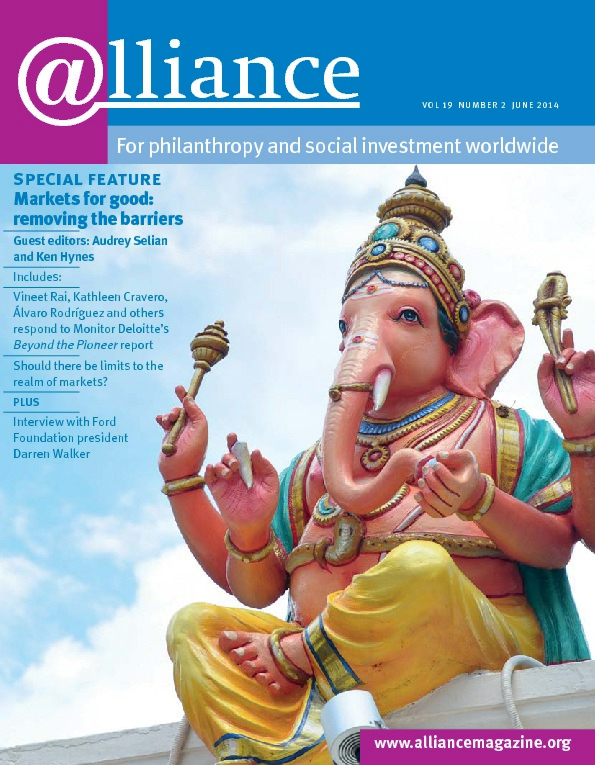Since the launch of Beyond the Pioneer at the Skoll World Forum and Sankalp Forum in early April, we’ve been discussing the report in cities across the US and UK with others – practitioners, funders, investors, entrepreneurs (and intrapreneurs), advisers and academics – who are committed to changing the lives of the poor through innovative, market-based approaches.
 We’ve been struck by the level of interest we’ve had. Clearly, this report has hit a nerve, revealing a problem that many people had sensed but not articulated. Our conception of the role of the industry facilitator in particular has brought the critical work of such facilitators to the fore. As more than one participant remarked: ‘You’ve given what I am doing a name. Now I have a job description!’
We’ve been struck by the level of interest we’ve had. Clearly, this report has hit a nerve, revealing a problem that many people had sensed but not articulated. Our conception of the role of the industry facilitator in particular has brought the critical work of such facilitators to the fore. As more than one participant remarked: ‘You’ve given what I am doing a name. Now I have a job description!’
Our interest in naming this role goes far beyond giving such facilitators due credit for their contribution. We see this as the first step towards working better together so we can be more effective in the future.
Some common themes
How can we work better together?
- These are just some of the questions we’ve been hearing:
- How do we put this into action?
- What does one do if one has no local presence?
- What can those with more limited resources (such as small foundations) do?
- When does one decide to step in to facilitate, and where should one intervene?
- Is it ever too early to step into facilitation?
- How do industry facilitators think about ‘exit’?
How will we join the dots?
From the responses we’ve been getting, we feel that our framework provides a relatively simple way for industry facilitators to diagnose and describe scaling barriers facing market-based solutions, and then to set about the more difficult task of resolving them. Because of their complex and multi-faceted nature, these barriers have often not been fully understood. By connecting the dots between the innovative firm and the system in which it sits, the framework allows different actors, from impact investors to multilateral development agencies, to recognize when they are working on a common problem and potentially bring their complementary capabilities to bear on it. Participants noted that connecting the dots would not be easy, since these diverse actors come with different backgrounds, incentives and languages.
How will facilitation be funded?
Many participants anticipated difficulty in securing funding for the kind of facilitation that creates much-needed public goods and infrastructure – ‘the plumbing that makes an industry work’, in the words of one participant – and engages at a systemic level, rather than directly with companies whose output numbers can be easily counted and reported. Moreover, it would be challenging to maintain this funding over the long period needed to really get solutions to scale, since so much funding flows to new and ‘sexy’ things. Some wondered if there might be a business model for industry facilitation that could pay for it out of the returns generated by the firms, rather than a model reliant on donor funding.
What about government?
There were also many questions about an appropriate role for governments:
- What are good ways to engage with government in industry facilitation?
- Could governments themselves be effective industry facilitators?
- At a more fundamental level, do successful market-based solutions let governments out of providing essential public services?
Regional round-up
These were the common themes, but discussions in each city were also shaped by particular local circumstances.
San Francisco Bay Area
In the San Francisco Bay Area and Seattle, there was a strong focus on entrepreneurship, and interest in the role that technology could play in helping address the challenge of scale. We faced rigorous questioning about why entrepreneurs could not solve these problems on their own with more resources. In the end, however, there was a clear acknowledgement that entrepreneurs working on base of the pyramid solutions faced greater challenges than their Silicon Valley counterparts, and many participants echoed our call for more industry facilitation to help them surmount these challenges. Professor Paul Brest of Stanford University put it best when he agreed with Louis Boorstin’s comment that ‘impact investing is sexy’, and went on to note: ‘Impact investing is sexy. Just like sex, it involves some risk and often involves a great deal of fantasy’, before exhorting the audience to take more risks to make the promise of impact investing a reality.
New York
In New York, participants grappled with the challenge of moving effectively into industry facilitation. Few disagreed that industry facilitators should be adaptive, changing tack as barriers and opportunities emerge, but many highlighted how difficult this is in practice: how does one judge when a particular course should be abandoned, and when it just needs a bit more time and effort? There was a sense that the report’s perspective might also be relevant to looking at social enterprise and non-profit models in developed economies like the US.
The need for industry facilitation was clearly appreciated by many, as was the fear that facilitation might not emerge spontaneously, but would require specific efforts to encourage it. In the words of Zia Khan of the Rockefeller Foundation, ‘do we need a facilitator for industry facilitators?’
Boston and Washington DC
Here the challenge of working together was seen as critical, since industry facilitation means, on some level, a collective effort. We heard concerns about the power dynamics involved when different facilitators and stakeholders come together since, as one practitioner pointed out, coordinated action often means a negotiated settlement.
The other strong theme in both cities was the need to alter our approach to funding and measuring results, from one focused on attribution to one that embraces contribution – and that over long periods of time, too. The thorny political and financial implications of this were picked over. We sensed great frustration as well as a promising level of openness to look for ways to change this. There was strong agreement on the need for impact investors in particular to embrace this broader perspective on scaling. Willy Foote of Root Capital captured this well when he said that ‘impact investors need to stop hanging out at the bar, talking among themselves, and actually get on to the dance floor and join the party.’ Meanwhile, Jane Nelson of Harvard University’s Kennedy School pointed to the need for more research on the roles that could be taken on by different types of facilitator and how they could be most effective across a wide range of different situations.
London and Oxford
Our conversations in the UK echoed much of what we had heard in the US, including the difficult problem of contribution vs attribution, and sustaining facilitation effort over the long term. There was also interest in the potential for industry associations to take on facilitation roles, though it was recognized that this would not solve all the barriers to scaling. It was also noted that these associations often lack the skills and leadership to be effective in these roles.
The question was also asked how the report fits in with other strands of practice and research in the field of market systems development in international development. The short answer is that it connects that sphere of practice – exemplified by approaches such as Making Markets Work For The Poor (M4P) and the Value Chain Approach, pioneered by official donor assistance agencies and their partners – with the growing interest in innovative firms and social enterprises, which is accompanied by a rising level of capital deployment through impact investors. It is clear to us that these two spheres overlap considerably and often deal with the same system-level problem without the means to align their actions to more effectively drive change.
We felt encouraged at the end of this leg of our roadshow by how strongly our key message on the need for industry facilitation had resonated. We also took away great advice from Claire Alexandre of Vodafone who noted, ‘holistic thinking is great but start with what you are good at first.’
Next stops …
We will be continuing this conversation in Singapore at the AVPN conference in May, followed by Paris and Berlin in mid-June, and finally at home in India in July. We wish to express our heartfelt thanks to our hosts so far: Skoll World Forum, Sankalp Forum, Stanford University PACS, David and Lucile Packard Foundation, Omidyar Network, Global Philanthropy Forum, The Rockefeller Foundation, Columbia Business School, Harvard Kennedy School, Aspen Institute/ANDE, USAID, DFID, and London Business School.
Harvey Koh is a director at Monitor Deloitte and co-leads the Monitor Inclusive Markets unit based in Mumbai, India. Email inmim@deloitte.com
Nidhi Hegde is manager at Monitor Inclusive Markets. Email nidhegde@DELOITTE.com
For more information
Find out more at http://www.beyondthepioneer.org and follow us on Twitter @MonitorInclMkts and #BeyondPioneer




Comments (0)